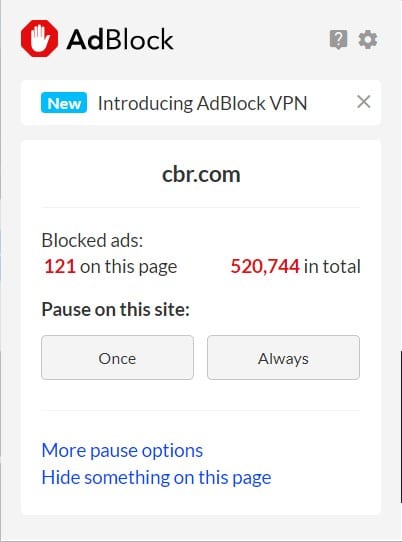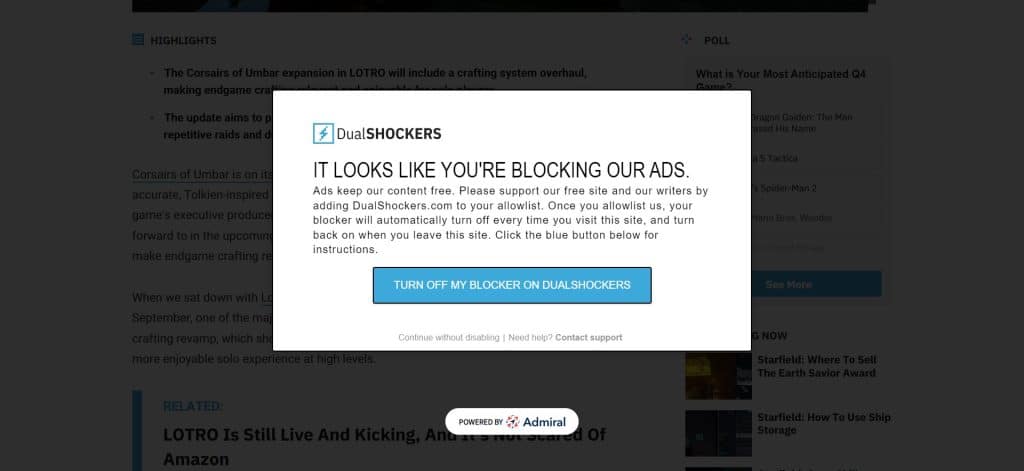What is an Ad Blocker?
An ad blocker is a type of software or feature designed to prevent advertisements from appearing when you’re browsing websites or using apps. In simple terms, it filters out the digital ads that usually pop up on your screen, making your online experience cleaner and often faster.
While the primary function is to block ads, some ad blockers also come with additional features, such as safeguarding your privacy by blocking trackers. Whether you install it as a browser extension, a standalone application, or use a browser with built-in ad-blocking capabilities, the end goal is the same: a smoother, ad-free browsing experience.
The Different Types of Ad Blockers
Ad blockers operate in a variety of ways to clean up your online experience, but they usually fall into one of three categories.
First, there are browser extensions like AdBlock and uBlock Origin, which are added to your web browser and work to filter out ads as you navigate websites.

Standalone software, on the other hand, is a separate application installed on your computer. This type offers broader coverage, blocking ads not just in your web browser but also in other software and apps.
Finally, some web browsers like Brave have built-in ad-blocking features, which eliminates the need for additional installations.
How Do Ad Blockers Work?
The primary mechanism of action for ad blockers is identifying what constitutes an advertisement. This is often done using preset criteria that could include specific images, text, or even the layout where an ad typically appears.
These criteria are part of what is known as a filter list, which contains rules and patterns that help the ad blocker recognize ads.
Users can usually subscribe to various filter lists to customize their ad-blocking, targeting different types of ads or even other elements like social media buttons. Many modern antivirus software programs include ad blockers.
Pros and Cons of Using an Ad Blocker
Ad blockers undeniably offer benefits, such as increased privacy and reduced website clutter, but they also present challenges, particularly for content creators who rely on ad revenue.
Here are some of the advantages of using an ad blocker.
- Enhanced Browsing Speed: Web pages usually load faster without ads. Ads, especially multimedia ones, can use up bandwidth and slow down your Internet browsing.
- Cleaner Web Experience: Ad blockers can remove distracting and intrusive ads. This contributes to an overall better browsing experience. It’s like watching a TV show without commercials.
- Improved Privacy: Many ad blockers prevent trackers, which are tools advertisers use to monitor your online activities. By blocking these, your online behavior remains more private (but not completely).
While all that may seem great, there are also a few cons you should consider before blocking those ads.
- Revenue Impact on Content Creators: Ads generate revenue for many websites and content creators. For some websites, maybe even your favorite ones, ad revenue is the only stream of revenue. By blocking these ads, you might be affecting their primary source of income, making it challenging for them to provide free content or even continue operating at all.
- Websites Might Not Function Properly: Some websites detect ad blockers and restrict content access until you disable the ad blocker. Others may not load correctly because the ad blocker interferes with the site’s functionality.
- Missed Relevant Ads: Not all ads are intrusive or irrelevant. You might miss out on useful offers or information tailored to your interests.
Ad blockers can improve your browsing experience by speeding up page loads and reducing distractions, but they do come with some drawbacks. Consider the implications of using them, especially when it comes to supporting content creators who rely on ad revenue.
Ad Blockers and Digital Ethics
Ad blockers have ignited discussions around digital ethics, particularly concerning the balance between user experience and the livelihood of content creators and publishers.
For many content creators and publishers, advertisements are a primary revenue source. With the proliferation of ad blockers, there’s an undeniable dent in potential earnings. Revenue loss can have a ripple effect, potentially leading to reduced content quality, fewer updates, layoffs, or, in extreme cases, shutting down entirely.
Websites that provide free content are particularly vulnerable, as they heavily rely on ad revenue to sustain their operations. Some respond to this challenge by implementing paywalls or requesting users to whitelist their sites.
From the user’s perspective, the choice to use an ad blocker often centers on a desire for a better browsing experience, faster loading times, and increased privacy.
However, there’s an ethical debate intertwined with this choice. Is it fair for users to consume content without viewing the ads that fund that content?
Some argue that if ads were less intrusive, users might be less inclined to block them. Others feel that in an era of data breaches and privacy concerns, users have the right to protect themselves, even if it means blocking ads.
The conversation around ad blockers and digital ethics is multi-faceted, requiring consideration from both the content creator’s and the user’s perspectives.
Finding a balance that respects both parties remains an ongoing challenge.
The Bottom Line
Ad blockers, designed to enhance the online browsing experience by eliminating ads, have become a significant tool for many Internet users. They come in various forms: browser extensions, standalone software, or built-in browser features.
While they undeniably speed up page loads and declutter the browsing space, they also have ramifications, particularly for content creators and publishers reliant on ad revenue.
This presents an ethical dilemma: the user’s right to a smooth, ad-free online experience versus the creator’s right to monetize their content.
Striking a harmonious balance between these interests is the industry’s challenge, hinting at the need for more sustainable and user-friendly advertising approaches in the future.







